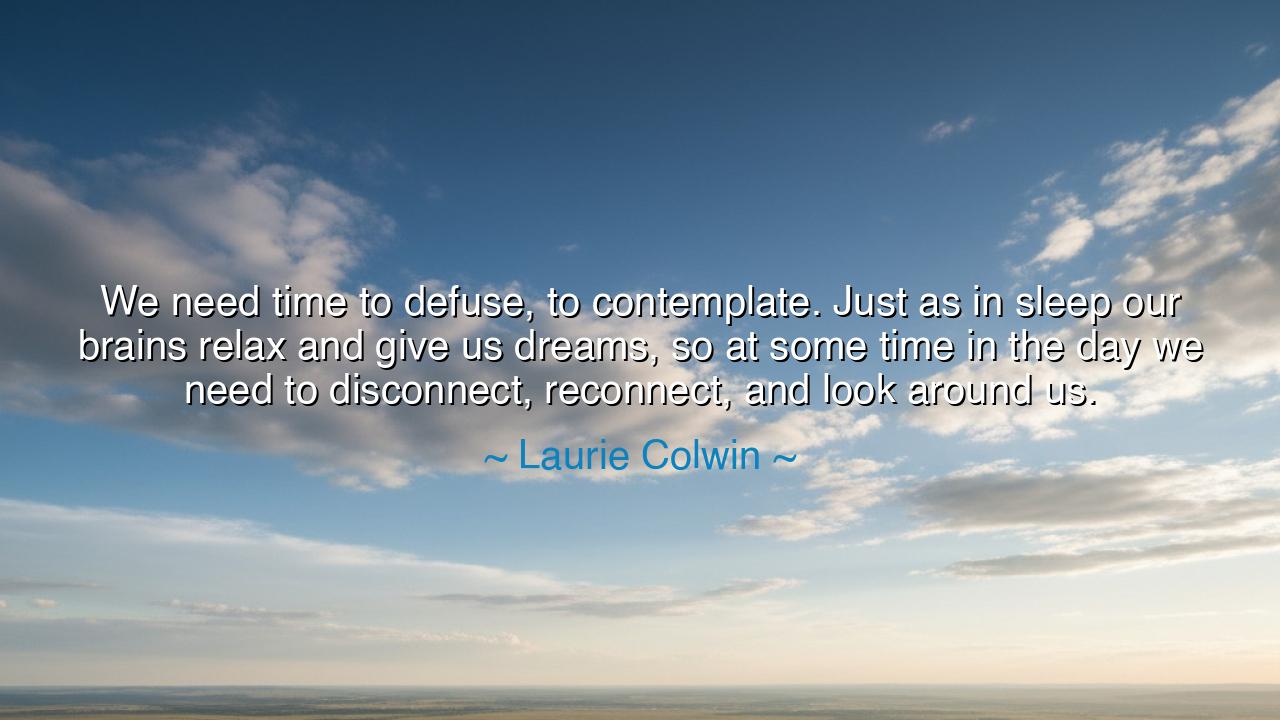
We need time to defuse, to contemplate. Just as in sleep our
We need time to defuse, to contemplate. Just as in sleep our brains relax and give us dreams, so at some time in the day we need to disconnect, reconnect, and look around us.






The words “We need time to defuse, to contemplate. Just as in sleep our brains relax and give us dreams, so at some time in the day we need to disconnect, reconnect, and look around us,” were written by Laurie Colwin, a novelist whose gentle wisdom flowed not from the noise of ambition but from the quiet pulse of human experience. In her words lies a truth that is both tender and profound: that the soul, like the body, requires rest; that reflection, not endless activity, is the wellspring of creativity, peace, and wisdom. She speaks not only of sleep, but of stillness—of the sacred art of pausing amid the ceaseless movement of the modern world.
To defuse is to release tension, to let the tightly wound springs of our minds loosen and breathe. In every age, mankind has struggled with the weight of its own busyness, but never more so than now. We are creatures who run from dawn to dusk, filling our hours with noise, tasks, and endless pursuit. Yet as Colwin reminds us, we were not made to live in constant acceleration. Even the sun rests beneath the horizon, even the tides recede before returning. The cycle of renewal demands both effort and stillness, both wakefulness and sleep. To deny this rhythm is to exhaust the soul until it can no longer dream.
Contemplation, she tells us, is the act of returning to ourselves. It is in silence that we begin to see the patterns of our thoughts, the meanings behind our actions, and the beauty we so easily overlook. Like the ancient philosophers who wandered under the olive trees, Colwin understood that wisdom grows not in noise, but in the quiet soil of reflection. To “disconnect” is not to withdraw from life—it is to reconnect with what is real: the wind, the breath, the light upon the face of a loved one. For in stillness, we begin to see again, to remember that the world is not made of deadlines and devices, but of moments and mysteries.
Consider the example of Leonardo da Vinci, whose genius was not born of unbroken labor, but of deliberate rest. He would leave his canvases unfinished for days, even months, not out of laziness, but to allow his mind to wander and dream. He knew that creativity blooms when the mind is free to play, to drift, to contemplate. From that silence emerged the inventions and visions that changed the world. His life echoes Colwin’s wisdom: that by stepping away from the work, one returns to it with deeper understanding.
Yet, to practice this art in our time requires courage. For we live in an age that glorifies constant motion, that calls rest a weakness and stillness a waste. We scroll through images instead of gazing at the sky; we chase connections in a thousand directions yet forget to connect with ourselves. But the wise know that without pause, the string snaps; without silence, the song dies. To defuse and reconnect is not indulgence—it is survival for the spirit.
Laurie Colwin’s insight also carries the gentle echo of nature’s law: every living thing must renew itself. The tree withdraws its sap in winter only to bloom again in spring. The body sleeps each night so that the mind may dream and heal. So too must the soul retreat from the clamor of the world to restore its strength. Those who ignore this rhythm grow hollow and weary, but those who honor it find clarity and peace blooming like dawn after darkness.
Let this, then, be your daily ritual, O seeker of balance: set aside time not for doing, but for being. Step away from your screens, your lists, your noise. Walk among trees, breathe deeply, watch the play of light upon the water. In those moments of quiet, you will find your spirit softening, your thoughts clearing, your creativity awakening once more. For it is in the still hour of the day that the whispers of truth can be heard.
Thus, Laurie Colwin’s teaching endures: we must learn to disconnect from the chaos in order to reconnect with life itself. To rest is not to waste time; it is to honor time. To dream is not to escape reality; it is to prepare the heart to face it anew. So pause each day, and in that pause, let your soul breathe—then you will not only see the world around you, but truly belong to it.






AAdministratorAdministrator
Welcome, honored guests. Please leave a comment, we will respond soon